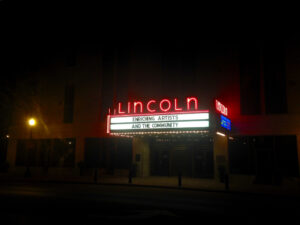A Matic Road Trip: Black Historical Landmarks From Columbus, Ohio through Central Illinois

Pack your bags — it’s time to take a road trip and explore Black historical landmarks located between our two Matic corporate offices!
In this three-part blog series through our partnership with Greenwood Seneca, we’ll travel from Columbus, Ohio to Phoenix, Arizona to highlight lesser-known locations that were significant to Black Americans throughout the era of segregation.
Many of the locations we’ll discuss were featured in The Green Books, which was an annual travel guide aimed at helping Black Americans safely travel across the United States. For this first part of the series, we’ll start off in Ohio and then travel through Indiana and Illinois.
Stop 1: Columbus, OH
Before we leave the Matic office, let’s check out two historical landmarks that still stand in Columbus today.
Victory Barber Shop: Located on the Near East Side, Victory Barber Shop served Black Americans during some of the nation’s darkest times. It was founded by John T. Gibson, and while Victory Barber Shop is no longer in business, it has been designated a historic landmark for its contributions to the Black community.
Located on 508 East Long Street, it was once a major socializing epicenter for Black men in Columbus and was frequently listed in the Green Books as a safe and welcoming place for travelers.

Lincoln Theater: Lincoln Theater was one of the few theaters in Columbus that openly served Black Americans during the era of segregation. In addition to movies, it also hosted weddings, church services, rallies, and concerts. Because of this, it was very much a cultural gathering place. Luckily, it is still in use today, and regularly has classes and events for people of all ages.
Stop 2: Indianapolis, IN
We’re heading west and as we do, let’s take a pit stop in Indianapolis based on three Green Book locations. Not all are still standing, but they are worth remembering.
Parkview Restaurant: Founded in 1926 by William R. Goins, a Black businessman, Parkview Restaurant regularly appeared in the Green Books during its publication. Because many restaurants once outright refused to serve Black Americans, Parkview Restaurant became a very successful chain of restaurants throughout multiple U.S. cities, including Indianapolis. Its original location was in Dayton, Ohio.
Sadly, Parkview Restaurant is no longer open, but it helped pave the way for inclusion across the United States. It was once located on 2112 Northwestern Avenue.
YMCA (450 N. Senate Street): During segregation, many YMCA locations were racially segregated despite its original purpose of unity. However, the 450 N. Senate Street location was one of the few branches that openly welcomed Black Americans.
Like other YMCAs, 450 N. Senate Street had a library, gymnasium, and a swimming pool. Because it was open to Black Americans, it was one of the ultimate “hang out” spots in Indianapolis. Even though it’s no longer open, it is considered a historic landmark for Black Americans.
Severin Hotel: As one of the few hotels that openly welcomed Black Americans, Severin Hotel was a popular destination for Black motorists traveling through Indianapolis. Opened in 1913, it was the epitome of a luxe hotel with its rooftop garden, gourmet dishes, and a ballroom that regularly held parties and events.
The Severin Hotel was a tourist destination for all travelers, and was even frequently visited by U.S. presidents and celebrities. Because of this, the Severin Hotel was a symbol for what America could be and not what it was during some of its darkest years.
Stop 3: Central Illinois
The final leg of this part of our road trip takes us through central Illinois. We’ll check out a historical church that is still open today as well as a former tourist home that always had an open door for Black travelers who needed somewhere to stay in the area.
Ricks Chapel African Methodist Episcopal Zion Church (Centralia, IL): As old as the Ricks Chapel congregation is, the building is actually a new addition when its entire history is taken into account. The congregation began in 1864 and would originally meet in private homes in the community to worship under the guidance of Reverend Nelson Ricks.
It wasn’t until 1910 (almost 50 years later) that an actual church was built. It is still in operation today under the guidance of Reverend Val Powe. It can be found at 438 N Poplar Street, Centralia, Illinois.
Mrs. B. Mosby Tourist Home (1614 E. Jackson Street, Springfield, IL): Tourist homes were regularly listed in the Green Book, and the Mrs. B. Mosby home is just one example. Since tourist homes provided safe lodging, Black Americans could journey across the United States and have a place to stay between destinations. Fortunately, there were more than a few in Springfield and all were regularly booked during peak travel seasons.
Today, Mrs. B. Mosby’s home is a private residence, but it’s a registered historic landmark.
Stay tuned for the second installment of our road trip series where we’ll travel through Missouri, Oklahoma, and Texas.
Greenwood Seneca is an organization that brings awareness to sites of Black history at risk of being forgotten. Supporting Greenwood Seneca will help further their mission of inviting the community to connect with Black historical sites and creating a unique space for Black community members to reclaim joy and honor their history. Additionally, Greenwood Seneca’s scholarship program supports students enrolled in HBCUs.
Consider making a donation today. Individual donations to The Matic Cares Foundation are matched 100%, up to $10k annually: https://www.paypal.com/donate/?hosted_button_id=LD35KFCPH6WXL
Learn more about The Matic Cares Foundation here: https://matic.com/matic-cares/
